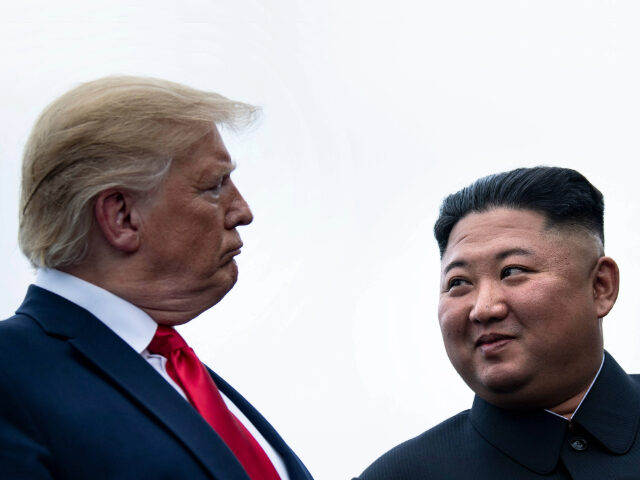The flagship state propaganda outlet of North Korea published a commentary on Tuesday responding to former President Donald Trump recalling his functional relationship with communist dictator Kim Jong-un, recognizing that Kim has positive “personal feelings” for Trump but dismissing that Pyongyang would improve its ties to Washington should Trump return to the White House.
The Korean Central News Agency (KCNA) acknowledged that Trump, in remarks to the Republican National Convention (RNC) in July, was “buoying a lingering desire for the prospects of the DPRK-U.S. relations.”
It nonetheless concluded, “Even if any administration takes office in the U.S., the political climate, which is confused by the infighting of the two parties, does not change and, accordingly, we do not care about this.”
Trump prioritized addressing the growing threat of a nuclear-armed North Korea — which conducted its last nuclear weapons test early into his first term as president — during his administration, ultimately becoming the first president to walk on North Korean soil, meeting with Kim on three occasions. In a sign that Kim still maintains a fondness for the former president, the ruthless communist dictator issued a rare statement of sympathy to Trump shortly after the July 13 failed assassination attempt against him in Butler, Pennsylvania.
In his extensive speech formally accepting the Republican nomination to the presidency, Trump dedicated some time to discussing his North Korea policy and his relationship with Kim specifically. Trump recalled that he “got along very well” with the dictator and remarked, “It’s nice to get along with somebody that has a lot of nuclear weapons.”
“When we get back, I get along with him. He’d like to see me back too. I think he misses me,” Trump said.
In a commentary otherwise extremely insulting to the United States — which, at one point, described America as a “backward country and rogue state in politics” — KCNA addressed Trump’s RNC remarks:
Amid the full-dress presidential election race in the U.S., Trump, who has been officially confirmed as a candidate for the Republican Party, said in his speech of acceptance for candidate that “I got along with them and it is nice to get along with someone who has a lot of nuclear weapons and otherwise.”
“It is true that Trump, when he was president, tried to reflect the special personal relations between the heads of states in the relations between states,” the state outlet continued, “but he did not bring about any substantial positive change.”
“He that puts on a public gown must put off a private person. The foreign policy of a state and personal feelings must be strictly distinguished,” the commentary continued, suggesting that Kim and Trump both harbor “personal feelings” at odds with their countries’ foreign policies toward each other.
Elsewhere in the article, KCNA dismissed attempts at peace with America on the grounds that America holds free and fair elections, and foreign policy can change from president to president. North Korea is run by a totalitarian, communist family cult that relegates anyone suspected of not supporting the regime fervently enough — and generations of the family — to decades in labor camps.
“Due to the serious strategic mistakes of the successive administrations, the era has come when the U.S. should really worry about its security,” KCNA concluded.
Trump’s relationship with Kim, hot on the heels of a historic decline in dialogue under former President Barack Obama, was initially belligerent. North Korean state media dismissed Trump as an “old lunatic” and “dotard” endangering his country. In November 2017, Trump decided to respond to the insults in kind.
“Why would Kim Jong-un insult me by calling me ‘old,’ when I would NEVER call him ‘short and fat?'” Trump wrote on the social media site Twitter. “Oh well, I try so hard to be his friend – and maybe someday that will happen!”
Why would Kim Jong-un insult me by calling me "old," when I would NEVER call him "short and fat?" Oh well, I try so hard to be his friend – and maybe someday that will happen!
— Donald J. Trump (@realDonaldTrump) November 12, 2017
Trump’s administration also spearheaded the implementation of an unprecedentedly strict sanctions regime on North Korea in December of that year, which top North Korean allies China and Russia supported.
The change in North Korea’s disposition was not immediate — in February 2018, the state newspaper Rodong Sinmun accused Trump of having a “nasty smell” and commanded he “urgently be sent to a lunatics asylum.” Trump, in turn, hosted a prominent North Korean defector as a guest at his 2018 State of the Union address. Pyongyang ultimately opened communications lines with the White House, however, and Kim agreed to meet with Trump.
In June 2019, Trump crossed the Demilitarized Zone (DMZ) into North Korea, becoming the first American president to enter the country in its history.
“Stepping across that line was a great honor,” Trump said at the time. “We [Trump and Kim] met and we liked each other from day one.”
Kim has not similarly engaged President Joe Biden, who, at press time, officially remains the president of the United States but has not been seen in public for five days. During the Trump administration, North Korean state media treated Biden with similar scorn, on one occasion calling him a “rabid dog” and warning Americans he “must be beaten to death with a stick.” Since becoming president, KCNA has mocked Biden’s “senility” — a line it used against “dotard” Trump before his meetings with Kim, as well — and ignored State Department attempts at communication. Biden himself has not prioritized Korean policy during his nearly four years in office, leaving South Korea to build bonds with other like-minded countries and pressure the North Atlantic Treaty Organization (NATO) to plan for a potential North Korean attack.

COMMENTS
Please let us know if you're having issues with commenting.